Ruptured Ovarian Cyst Symptoms: How to Know If Ovarian Cysts Ruptured?
Fertility Treatment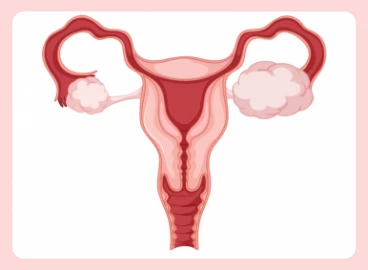
An ovarian cyst is a small sac filled with blood or yellowish fluid that develops in one or both ovaries. Despite being common, ovarian cysts can be a life-threatening issue in case of rupture and bleeding, so they must be treated fully and in time.
Ovarian cyst formation is a common problem among women of childbearing age. Regardless of their size, ruptured ovarian cysts can cause complications such as bleeding, inflammation, and severe abdominal or back pain. Diagnosing ovarian cysts involves a thorough pelvic examination, often utilizing ultrasound to assess their size and location. Understanding what size of ovarian cyst is dangerous is crucial in determining appropriate management and preventing potential complications.
Knowing the symptoms of a ruptured ovarian cyst allows for faster treatment and prevention of its complications. To avoid the side effects of ovarian cyst rupture, women must get routine checkups and report any symptoms of ovarian cyst formation or rupture to their gynecologists. This article discusses ovarian cyst rupture symptoms, its causes, prevention, and treatment methods.
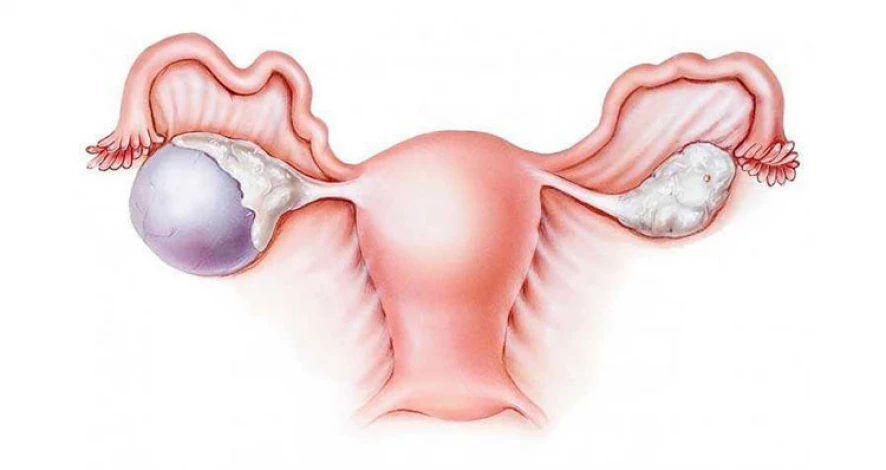
What Are Ruptured Ovarian Cyst Symptoms?
Sometimes, the ovarian cysts pop without any symptoms, but in many cases, the signs of their rupture can be clearly seen and felt. In such a situation, seeking medical help and treating it promptly is urgent. Understanding what does a ruptured ovarian cyst feel like is important for recognizing the urgency of seeking medical attention and initiating appropriate management. The main symptoms of a ruptured ovarian cyst are:
- Severe abdominal pain
- Bleeding
- Abdominal distension
In the following, you can get detailed information about these symptoms.
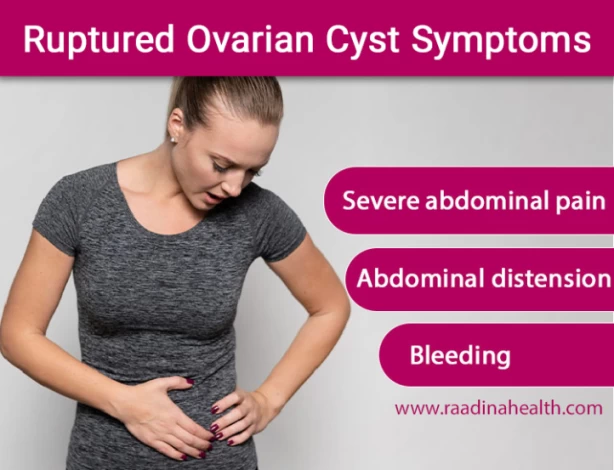
Severe abdominal pain
Sudden, sharp, and severe pain in the abdomen is one of the main and primary signs of ovarian cyst rupture. In some rare cases, also, the patients feel numbness in their stomach and back. Interestingly, the right ovary is more prone to cyst rupture due to its different structure of blood vessels and elevated blood pressure.
So, if you have an ovarian cyst and feel sudden, intense pain on the right side of your stomach, you must contact a doctor right away. If you feel mild pain, you can take painkillers like ibuprofen and ketorolac, but if you have severe pain, you need to get a quick examination.
Bleeding
In most cases, rupture of ovarian cysts (especially functional ones) is associated with intra-abdominal bleeding, but as this usually happens during menstrual bleeding, it is not easily recognized. Since the corpus luteum (CL) cysts have innumerable blood vessels in their walls, symptoms of internal bleeding from ruptured ovarian cyst are highly probable. In any case, severe and excessive bleeding can be dangerous and life-threatening, so it must be diagnosed and treated straight away.
Studies have revealed that several cysts with abnormal shapes are formed when a chocolate cyst bursts up. Still, when corpus luteum cysts rupture, they cause bleeding in the peritoneal cavity (the space between the abdominal organs and the inner layer of the abdominal wall).
Abdominal distension
Due to the excessive growth of cysts on the verge of bursting, the abdomen swells. Enlargement of the cysts puts pressure on the other internal organs. Even when the ovarian cysts rupture, and their fluid leaks, abdominal distension continues for some time. Therefore, abdominal distension and bloating are the most common symptoms and complications of ovarian cyst rupture.
Other Symptoms of Ruptured Ovarian Cyst
One of the symptoms mentioned above alone not ensure that the ovarian cyst has popped; however, if it is accompanied by other symptoms such as dizziness, fever, nausea, vomiting, etc., the patient must immediately refer to a doctor.
Here are some of the other possible symptoms:
Pain During or Shortly After Physical Activity or Intercourse
One of the symptoms of a ruptured ovarian cyst is pain during or shortly after physical activity or intercourse. This discomfort may be due to the cyst's movement within the abdomen, causing irritation or pressure on surrounding tissues. The pain can range from mild to severe and may be localized on one side of the lower abdomen or pelvis. If you notice this type of pain, especially if it persists or worsens, it's essential to consult with a healthcare provider to determine the cause and appropriate management.
Changes in Bowel Movements, Such as Constipation or Diarrhea
The presence of a cyst can disrupt the normal function of nearby organs in the abdomen, such as the intestines, leading to alterations in bowel habits. Constipation may occur due to pressure on the intestines, while diarrhea could result from increased fluid secretion or irritation. These changes in bowel movements, particularly if persistent or severe, should prompt a visit to a healthcare professional for evaluation and treatment.
Difficulty Emptying the Bladder or Increased Frequency of Urination
Difficulty emptying the bladder or experiencing increased frequency of urination can also be symptoms of a ruptured ovarian cyst. As the cyst grows or ruptures, it can pressure the bladder or nearby structures, leading to urinary symptoms. This pressure can cause discomfort or difficulty with urination, as well as an increased urge to urinate more frequently. If you notice these symptoms, seeking medical attention to rule out any complications and receive appropriate management to alleviate discomfort and ensure urinary tract health is crucial.
It's worth mentioning that sometimes anemia resulting from a ruptured ovarian cyst causes symptoms such as an increase in the heart rate or a decrease in blood pressure. Also, irregular menstruations, delayed periods for more than three days, and digestive problems can be symptoms of a ruptured cyst.
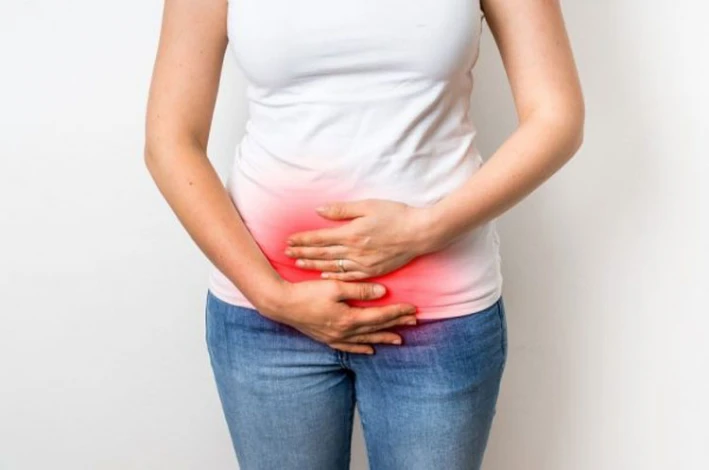
Ruptured Ovarian Cyst Diagnosis
To diagnose a ruptured ovarian cyst, first, the doctor checks the medical history of the patient and measures her symptoms. Then, they perform a pelvic examination to diagnose the ruptured ovarian cysts and take the necessary measures to drain them.
Confirming ovarian cyst rupture is quite hard and requires differential diagnosis; in other words, the doctor needs the results of different medical tests to rule out diseases with similar symptoms, such as appendicitis, ectopic pregnancy, kidney stones, etc. In general, the most common methods of diagnosing ruptured ovarian cyst include:
- Ultrasound to detect the location, shape, and size of ovarian cysts
- Urine test to find other causes of abdominal pain
- Blood test to check for anemia and infection
- CT scan to check the ovaries by X-ray
- Endocervical culture test to diagnose pelvic infection
Reasons for Ovarian Cyst Rupture
Several factors can cause the ovarian cysts to rupture, many of which can be prevented and controlled. The enlargement of the cysts increases the possibility of their rupture; therefore, you need to take preventive and therapeutic measures if you have enlarged, dangerous cysts. In the following, the main causes of ovarian cyst rupture are enumerated.
- Hormonal changes, especially the ones related to the menstrual cycle
- Formation of new cysts or enlargement of the previous ones during the pregnancy
- Not having blood clotting factors
- Taking anticoagulants (medicines that help prevent blood clots)
- Rupture or leakage of large cysts due to sexual intercourse
- Straining while pooping in people with severe constipation
- Being hit in the abdomen, the areas around the ovaries, or other parts of the pelvic cavity
- Doing sudden movements during exercise and even bending to pick up heavy objects
- Occurrence of ectopic pregnancy, i.e., when the embryo develops somewhere other than the uterus
- Internal bleeding caused by spleen or liver rupture
- Having appendicitis or inflammation of the appendix
- Having ovarian endometriosis (development of endometrial cells around the ovary)
Ruptured Ovarian Cyst Side Effects
In cases where ovarian cyst rupture is accompanied by mild or no symptoms, the life of the patient is not in danger, and she will not face serious complications. However, she should get medical attention right away if she experiences severe bleeding and uncontrollable pain.
If necessary, the patient should be hospitalized, and surgeries such as laparoscopy (with small abdominal incisions) or laparotomy (with large abdominal incisions) should be done to remove the cysts and prevent excessive bleeding. The patient might face the following side effects before or after the treatment.
- Heavy bleeding
- Infection
- Formation of a blood clot
- In case of undergoing surgery, the incisions may not heal properly (rare)
- Scarring after the surgery
- In the case of undergoing laparoscopy, the surgeon may have to make large incisions
- Damage to nerves and blood vessels
- Damage to the muscles or organs near the ovaries
Ruptured Ovarian Cyst Treatment
Choosing the right treatment for a ruptured ovarian cyst depends on the type of the cyst and the severity of the complications after its rupture. With small cysts, the doctor only prescribes painkillers and monitors the condition of cysts.
However, if the cysts are large and the patient has severe symptoms, she should get intravascular painkillers and a blood transfusion to compensate for the blood she has lost. Whether the cyst is small or large, the doctor controls the patient's vital signs, measures the level of her red blood cells, and checks her pelvis for the signs of intra-abdominal bleeding with the help of ultrasound.
Large and painful cysts can be removed either by laparoscopy or laparotomy. In these operations, which are done under anesthesia, the cysts are removed by special surgical tools and through incisions. During the ovarian cyst surgery, the doctor controls the internal bleeding and removes fluids and blood clots from the body. In some rare cases, due to the risk of developing cancerous cells, the doctor may remove the ovaries or uterus, too.

What to Do after Ruptured Ovarian Cyst?
After the ruptured cysts are removed, it is crucial to take care of the body. In mild cases, the patient can manage her pain by taking prescribed painkillers and resting at home. In extreme situations, the patient typically remains in the hospital for 24 to 48 hours so that the physician can keep an eye on them. The doctor then periodically examines her vagina and pelvic cavity to ensure that the cancerous cells have not grown and that the bleeding has stopped.
Make a mental note that having symptoms such as extreme dizziness or severe pain in the abdomen after removing a ruptured ovarian cyst is not usual and must be treated in a short time. So, if you have the mentioned symptoms, inform your doctor and prepare for imaging (ultrasound, CT scan, X-ray) and blood tests.
You must limit your physical activity and refrain from participating in strenuous sports until the wounds are fully healed if the ruptured cyst is surgically removed. To avoid infection, you must also practice proper personal hygiene.
When Should I Visit the Doctor After Ovarian Cyst Rupture?
Pay regular visits to your gynecologist, because routine check-ups for tracking down any potential reproductive health problems, including ovarian cysts are a must. Generally speaking, acute back and abdominal pain, tightness and pressure beneath the stomach, and irregular bleeding are abnormal and may indicate an ovarian cyst rupture.
Moreover, ovarian cyst rupture should be treated seriously and reported to the doctor as soon as possible because it is linked to other medical disorders like appendicitis, ectopic pregnancy, liver and spleen bleeding, etc.

Ovarian Cyst Treatment in Iran
In Iran, various ovarian cyst treatments are done to reduce the risk of their rupture, preserve the ovarian reserve, and increase the fertility rate in women with PCOS. Iranian fertility specialists usually start the treatment process with medications such as contraceptive pills to prevent future cysts from forming.
However, if the cysts are already formed and developed, the surgeons perform laparoscopy and laparotomy to remove the cysts and prevent the complications of their rupture. Therefore, you can always rely on the expertise of Iranian surgeons and have your ovarian cysts treated permanently.
How to Prevent Ovarian Cyst Rupture?
There is no specific method to prevent ovarian cyst rupture and its side effects. However, if you get regular check-ups and examinations, the doctor may diagnose cysts at risk of growing and bursting in time and prevent their rupture.
In such a situation, the development stage of the cysts should be continuously monitored by the doctor. If they do not shrink or disappear naturally or by medicines, they should be surgically removed before bursting.
It should be noted that getting regular examinations is important in controlling women's ovarian reserve, too, because it checks for AMH levels in the blood. If diminished ovarian reserve (DOR) is confirmed, you can start the fertility treatments right away to preserve the remaining eggs.
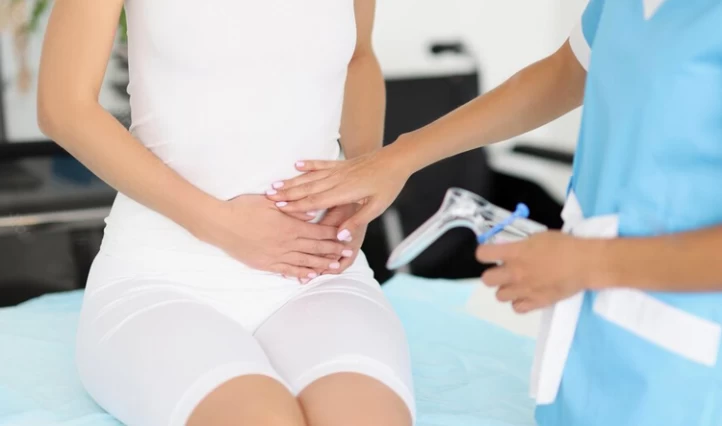
Conclusion
To sum up, having an ovarian cyst is a common problem among women during their reproductive age and often resolves on its own or with certain medicines. But in some cases, as the cysts develop and enlarge, they may pop and cause severe pain and bleeding. Current treatment methods can control the complications of a ruptured ovarian cyst and minimize its risks.
However, it is suggested to get regular check-ups and be aware of the primary symptoms of ovarian cyst rupture, such as sudden pain in the abdomen, bleeding, bloating, and prolonged dizziness.
FAQs About Ruptured Ovarian Cyst
How long does ruptured ovarian cyst pain last?
The duration of pain from a ruptured ovarian cyst can vary depending on factors such as the severity of the rupture and individual healing time. In many cases, the pain may subside within a few days to a week with appropriate treatment, such as pain medication and rest. However, some individuals may experience lingering discomfort or intermittent pain for several weeks as the body heals.
How severe is the pain associated with a ruptured ovarian cyst?
The pain from a ruptured ovarian cyst can vary from mild to severe. It often presents as a sharp, sudden pain in the lower abdomen or pelvis, which may radiate to the lower back or thighs.
Can a ruptured ovarian cyst cause fainting or dizziness?
Yes, in some cases, a ruptured ovarian cyst can lead to fainting or dizziness. This may occur due to the sudden onset of severe pain or internal bleeding, which can cause a drop in blood pressure.
Are there specific activities or movements that can trigger a ruptured ovarian cyst?
While a ruptured ovarian cyst can sometimes occur without any specific trigger, certain activities or movements that put pressure on the abdomen, such as heavy lifting or vigorous exercise, may increase the risk of rupture.
How can I differentiate between symptoms of a ruptured ovarian cyst and other abdominal issues?
Symptoms of a ruptured ovarian cyst, such as sudden and severe abdominal pain, nausea, and bloating, can resemble those of other abdominal issues, such as appendicitis or ectopic pregnancy. However, a healthcare provider can perform a physical examination and diagnostic tests, such as ultrasound or CT scan, to determine the cause of your symptoms.
What should I do if I suspect I have a ruptured ovarian cyst?
If you suspect you have a ruptured ovarian cyst based on your symptoms, it's essential to seek medical attention promptly. Contact your healthcare provider or visit the nearest emergency room for evaluation and appropriate treatment. Ignoring symptoms or delaying treatment can lead to complications and worsen the condition.
Are there specific risk factors that increase the likelihood of a ruptured ovarian cyst?
While ovarian cysts can occur in women of any age, certain factors may increase the risk of cyst rupture. These include hormonal changes, such as those associated with the menstrual cycle or fertility treatments, as well as conditions, such as polycystic ovary syndrome (PCOS) or endometriosis.
Can emotional stress contribute to the rupture of ovarian cysts?
While emotional stress is not a direct cause of ovarian cyst rupture, it can exacerbate symptoms and potentially increase the risk of complications. Stress may lead to hormonal fluctuations that can affect ovarian function and exacerbate existing cysts. Managing stress through relaxation techniques, exercise, and seeking support from friends or mental health professionals may help reduce the impact on ovarian health.
Can a ruptured ovarian cyst affect fertility?
In some cases, a ruptured ovarian cyst can impact fertility, particularly if it leads to complications such as infection or scarring of the ovaries or fallopian tubes. Additionally, underlying conditions that predispose individuals to ovarian cysts, such as PCOS or endometriosis, may also affect fertility. It's essential to discuss concerns about fertility with a healthcare provider who can provide personalized guidance and treatment options.
Is surgery always necessary to treat a ruptured ovarian cyst?
Surgery is not always necessary to treat a ruptured ovarian cyst. In many cases, conservative management may be sufficient, such as pain medication, rest, and monitoring for complications. However, if a cyst causes severe symptoms or complications such as internal bleeding or infection, surgery may be necessary to remove or address any associated issues. The decision to undergo surgery will depend on the individual's symptoms, overall health, and the severity of the cyst rupture.
What to expect after an ovarian cyst ruptures?
After an ovarian cyst ruptures, you may experience sudden pelvic pain, bloating, mild vaginal bleeding, or abdominal discomfort. In most cases, the body absorbs the fluid naturally, but severe pain or dizziness may indicate complications that require medical care.
Can ovarian cysts cause diarrhea?
Yes, in some cases, ovarian cysts — especially if ruptured or pressing on the bowel — can cause digestive issues such as diarrhea, constipation, or bloating. If diarrhea is accompanied by pelvic pain or bleeding, consult a doctor.
What does discharge from a ruptured ovarian cyst look like?
A ruptured ovarian cyst may cause light vaginal spotting or watery discharge. If the discharge is heavy, has clots, or comes with severe pain, it could be a sign of internal bleeding and requires urgent evaluation.
How long does pain from a ruptured ovarian cyst last?
Mild to moderate pain after a ruptured ovarian cyst usually lasts a few hours to a few days. Persistent or worsening pain beyond this timeframe may suggest complications such as internal bleeding or infection.
What are the symptoms of internal bleeding from a ruptured ovarian cyst?
Internal bleeding symptoms include sharp abdominal pain, fainting, rapid heartbeat, dizziness, and heavy vaginal bleeding. These are medical emergencies and should be treated immediately.
When should I go to the ER for a ruptured ovarian cyst?
If you experience sudden severe pain, fainting, rapid breathing, or uncontrolled bleeding, go to the emergency room right away, as these can signal a ruptured cyst with dangerous complications.
Can a ruptured ovarian cyst affect fertility?
Most ruptured ovarian cysts do not affect fertility. However, if the rupture is caused by conditions like endometriosis or polycystic ovary syndrome (PCOS), fertility may be impacted and should be assessed by a specialist.



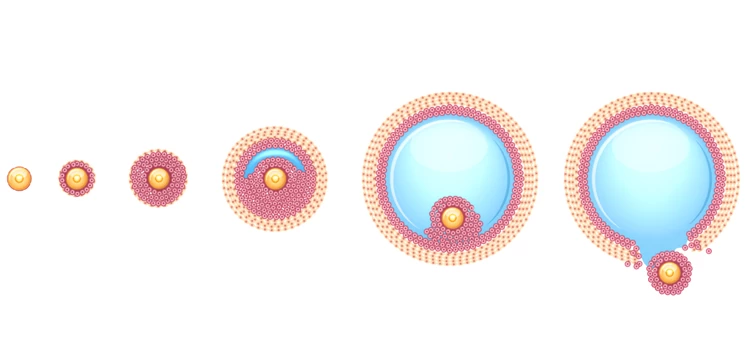
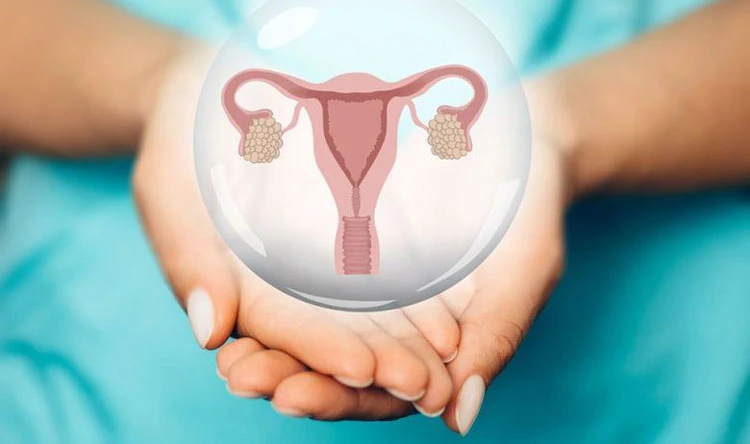
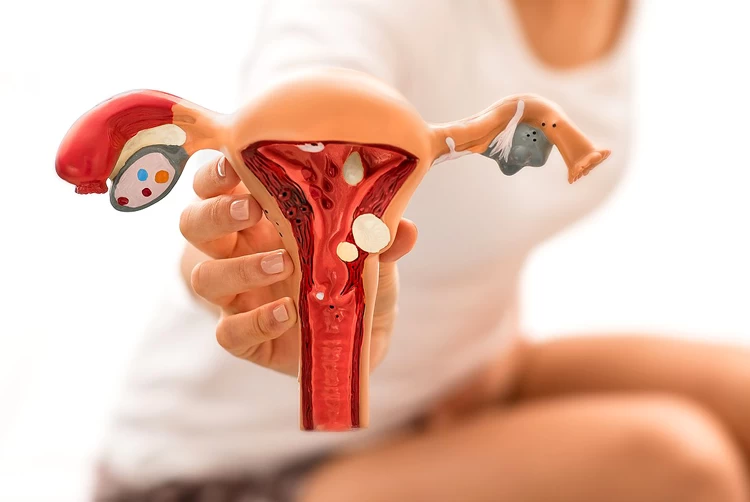



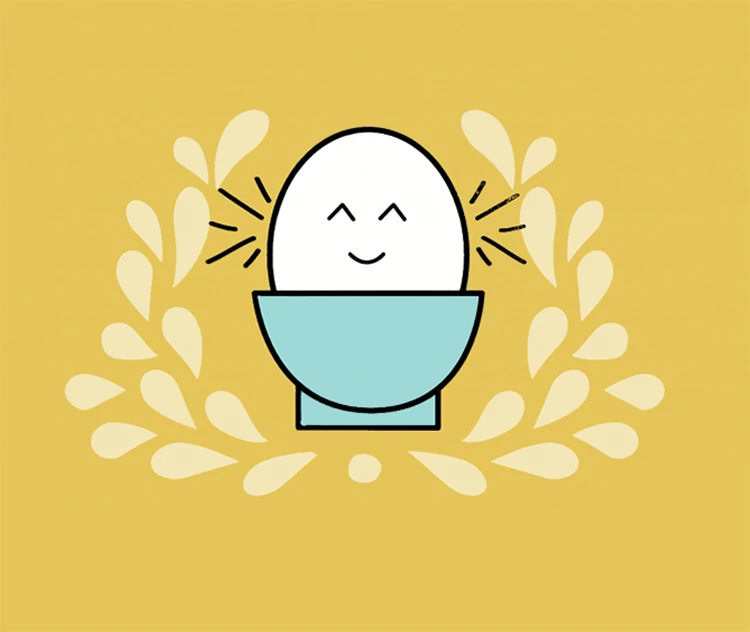

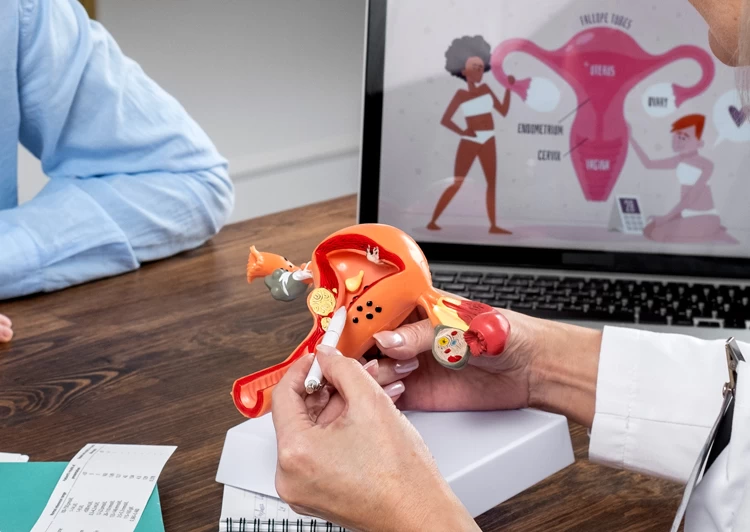
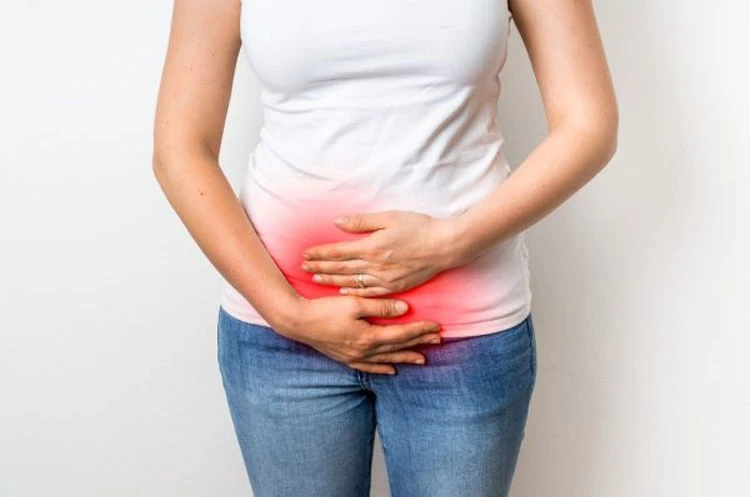

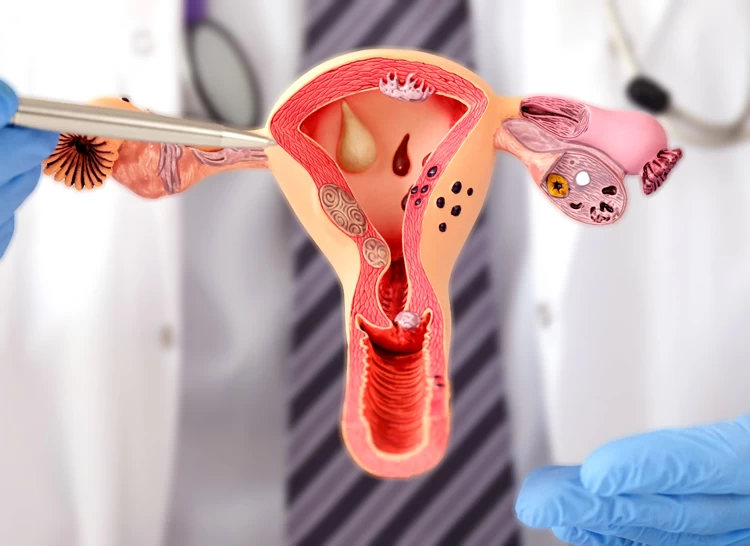

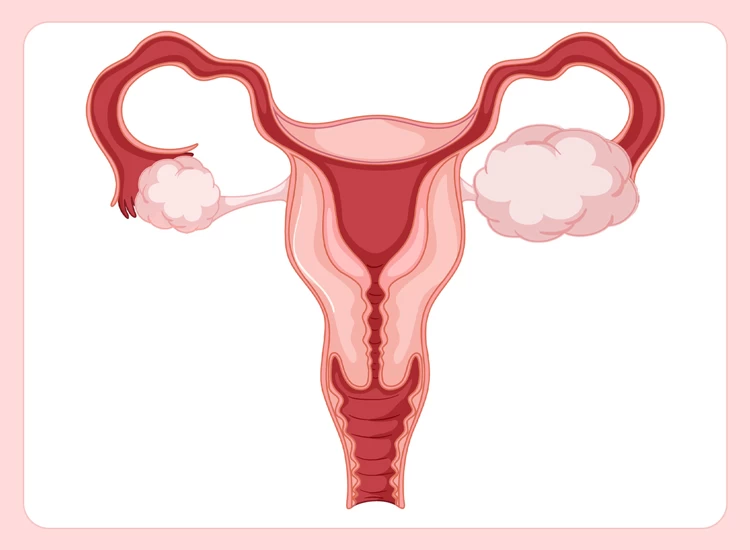
No reviews
Your comment